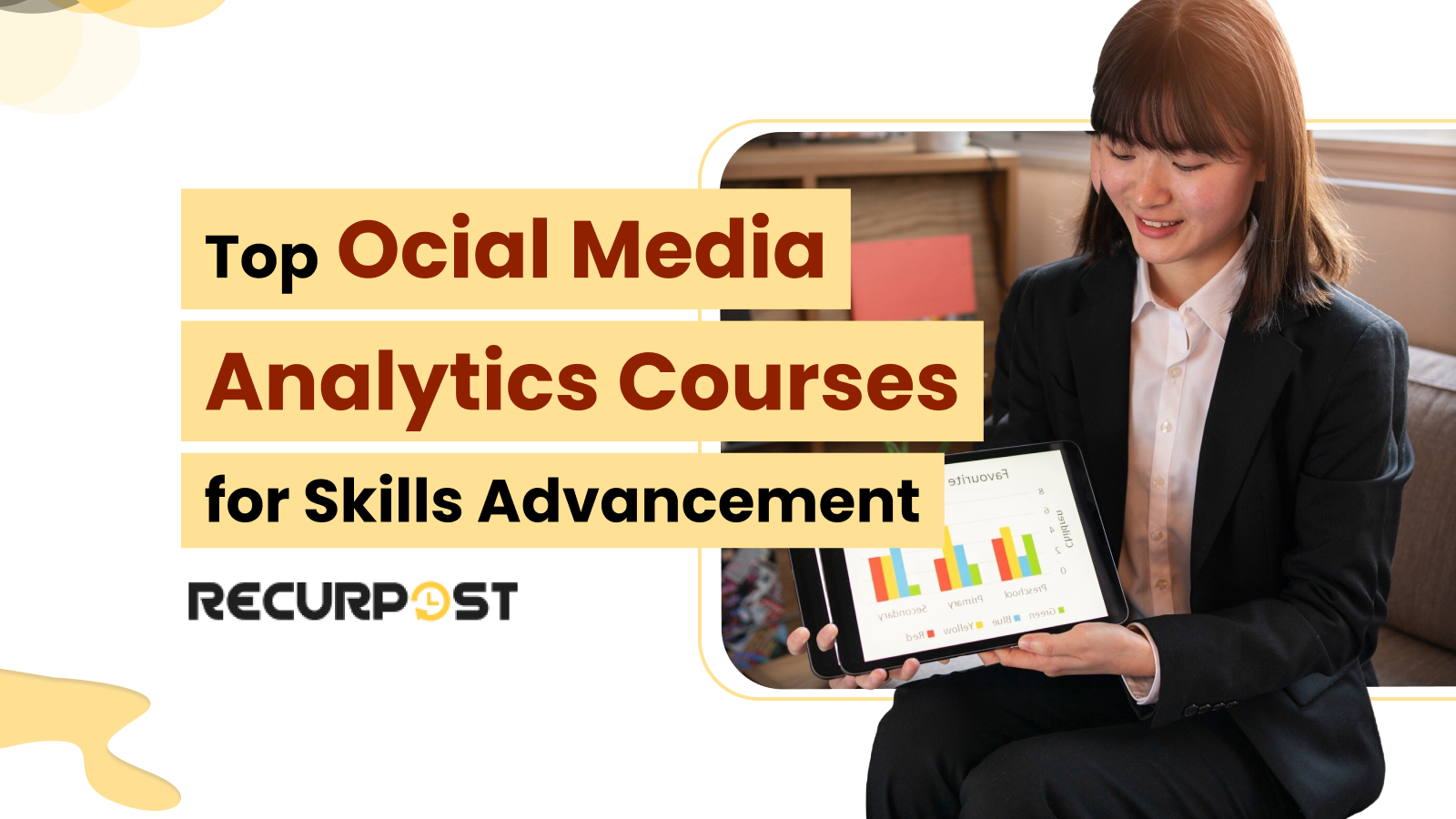Which Social Media Analytics Course Best Advances Your Marketing Skills in 2025?
The best course for advancing your social media analytics skills in 2025 matches your specific needs, whether you are running client ads, tracking post clicks, or writing data-driven content. This post lists the Top Social Media Analytics Courses for Skills Advancement 2025, with real examples, free and paid options, and even programs that help you master coding tools like Python.
Social media analytics requires data-driven decision-making. Whether you’re managing a digital agency, a local shop, doing freelance work, or working in online teaching or real estate, numbers guide content strategy.
Analytics reveal effective content, optimal ad spend allocation, lead-generating posts, and sharing metrics. With proper social media data analysis programs, you can turn raw numbers into measurable campaign results.
This blog is for readers who:
- Need metrics-based Facebook or Instagram strategies
- Seek quantifiable content performance measurement skills
- Want to increase brand visibility and audience reach efficiently
We’ll cover the most up-to-date courses from places like Coursera, LinkedIn Learning, Hootsuite Academy, and more. You’ll also learn the difference between social media monitoring (what people say about you) and social media listening (what you learn from those conversations). Furthermore, we’ll explore which programs offer certification options that impress clients or employers, enhancing your professional credentials.
Stick around to find your fit, whether you’re interested in social media analytics certification, platform-specific specialisations (like Facebook Analytics & Insights, Instagram Insights & Metrics, Twitter Analytics & Network Analysis), or mastering tools like Python and R for social media data.
Not every social media analytics course fits every marketer. The best course for you depends on your specific needs, time availability, and whether you want a certificate to display on LinkedIn.
Here’s what to consider before you click enroll:
1. Target platform focus
Some courses specialize in single platforms, so it’s essential to choose one based on where you focus your marketing efforts. For example:
- Instagram hashtag optimisation requires a course like Instagram Insights & Metrics, while B2B marketers benefit from LinkedIn Analytics training. Examples of platform-specific courses:
- Facebook Analytics Certification Course
- TikTok Analytics Fundamentals
- YouTube Analytics Advanced Program
These specialised courses are crucial if you’re looking for platform-specific specializations to deepen your social media metrics training.
2. Course duration
The duration of courses varies widely. Freelancers and those with limited time may prefer shorter courses that last 2-4 hours. On the other hand, coaches or those teaching analytics may need comprehensive, in-depth programs that last 8 weeks or longer.
3. Learning format
Learning format affects how you can progress through the course:
- Self-paced: You move through the course at your own speed, making it ideal for people with irregular schedules.
- Instructor-led: This structured approach comes with deadlines and guidance from experienced instructors, perfect for those who need more direction.
- Hybrid: A mix of self-paced and instructor-led sessions, offering a balance of flexibility and structure.
4. Certification options
Some courses offer certificates that can be showcased on platforms like LinkedIn. Others provide badges or statements of accomplishment. If your goal is to enhance your resume or impress clients, look for courses that offer professional certificates with industry validation.
5. Skill level requirements
Different courses cater to various skill levels:
- Beginner: No prerequisite knowledge is required. These are perfect for those just starting in social media analytics.
- Intermediate: Typically requires some knowledge, such as dashboard interpretation skills.
- Advanced: Requires proficiency in tools like Python or R for social media data analysis.
6. Price structure
Costs can vary widely:
Subscription model: For ongoing access, a subscription of around $29 per month could be more cost-effective.
Free courses: Budget-conscious learners can access free options from platforms like HubSpot Academy or Quintly Academy.
One-time payment: Typically between $50 and $300, depending on the course’s depth and certification.
7. Instructor credentials
When evaluating a course, check the instructor’s credentials. Look for instructors with 10+ years of industry experience or academic qualifications, such as an associate professor. Practical experience in managing social media campaigns adds considerable value to the course.
8. Tool and platform coverage
Verify that the course covers the tools and platforms that matter to you. Multi-platform management requires broader coverage than single-platform specialization. For instance, a course that addresses Facebook, Instagram, and Twitter analytics will offer more comprehensive knowledge than one focused solely on Instagram Insights.
Selection tip:
Before committing to a paid course, it’s a good idea to investigate free audit options to assess whether the course suits your needs. Many platforms offer free social media analytics courses or free trials for premium courses, allowing you to experience the learning format, instructor quality, and content before making a financial commitment.
By taking advantage of these free courses, you can ensure that the course aligns with your skill level and provides the right tools and platform coverage, whether you need platform-specific specializations or more in-depth social media metrics training.
Introduction to Free Social Media Analytics Courses

Free social media analytics courses provide entry-level training for marketers looking to develop digital skills without a financial investment. These programs cover the fundamentals of social media, including strategy development, platform-specific features, content creation, audience targeting, and results-driven campaign execution.
Top universities like Northwestern University offer free social media marketing courses that combine academic theory with practical application, ideal for those starting their journey into social media analytics. Business owners enhancing their online presence and aspiring marketers can gain valuable knowledge and tools through these programs.
Social media marketing skills remain essential for business growth and maintaining a competitive advantage in today’s digital markets. Whether you’re looking to improve audience reach, optimise content strategies, or measure campaign success, these free courses provide a solid foundation.
Course Formats and Structures in Social Media Analytics Courses
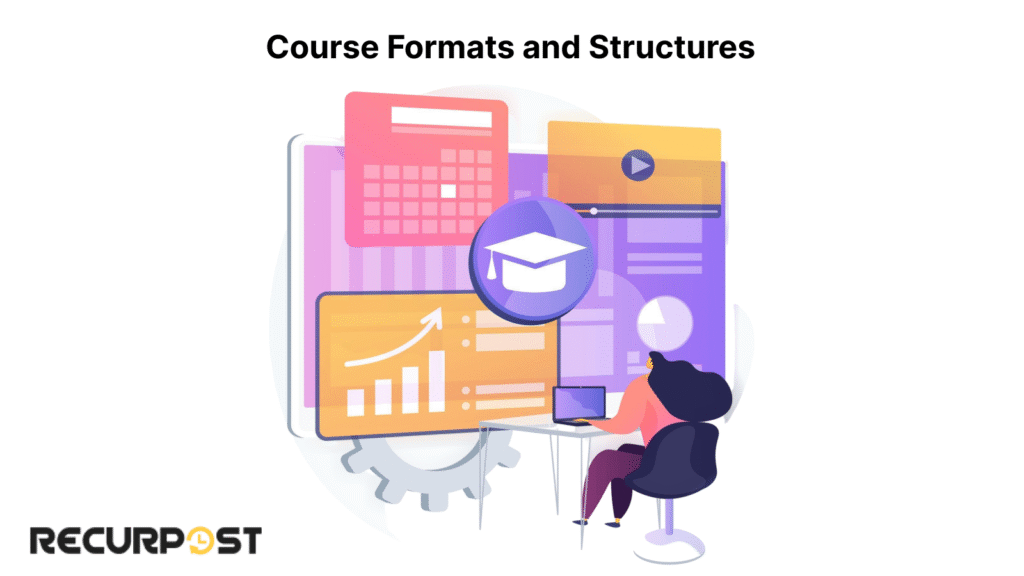
Social media analytics courses accommodate diverse learning styles and schedules. Self-paced options allow flexible progression through materials, making them ideal for busy professionals managing multiple responsibilities. Instructor-led programs provide structured learning with scheduled sessions, interactive Q&As, and personalised feedback, ensuring that learners receive expert guidance throughout the course.
Most courses deliver content through video lessons, practical resources, and platform-specific exercises, focusing on skills such as Facebook Analytics, Instagram Insights, or LinkedIn Analytics. These elements are crucial for those looking to develop platform-specific specialisations.
Specialised courses target platform-specific skills for Facebook, Instagram, or LinkedIn, allowing learners to customise their education based on business requirements. Whether you’re interested in social media metrics training or learning conversion tracking, selecting formats aligned with personal learning preferences, be it visual, textual, or interactive. Maximises skill development efficiency while staying current with the latest strategies and platform changes.
Free Social Media Analytics Courses with Certification
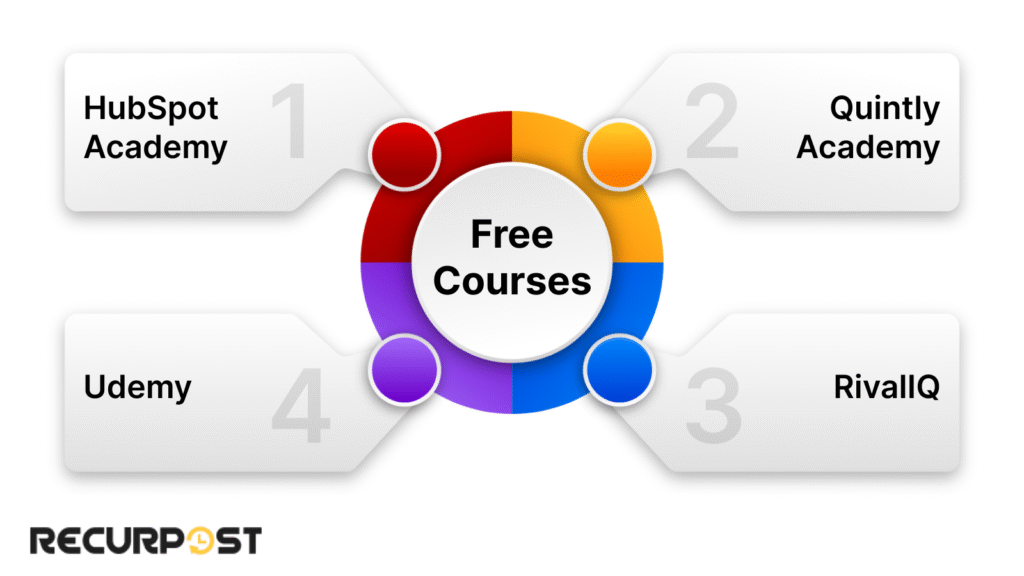
1. HubSpot Academy – Social Media Marketing Certification
[Avail Free Course: Hubspot]
- Duration: About 5 hours
- Level: Beginner
- Format: Self-paced video, quizzes
- Certificate: Yes – HubSpot Certificate
- Price: Free
- Instructor: HubSpot Experts (e.g., Kevin Phillips, 10+ years experience)
- Platforms Covered: Facebook, Instagram, Twitter, LinkedIn
Modules Include:
- Social Listening & Monitoring
- Engagement Boosting Tactics
- ROI & Conversion Basics
- Content Planning
Outcomes:
- Track KPIs like click-through rates
- Use Facebook Insights and Instagram Insights
- Create performance reports
Quick tip: Use their free analytics templates to practice what you learn.
2. Quintly Academy – Social Media Analytics Course
[Avail Free Course – Quintly]
- Duration: 3–4 hours
- Level: Beginner
- Format: Self-paced video, quizzes
- Certificate: Yes – Quintly Certificate
- Price: Free
- Instructor: Quintly Data Team
- Platforms Covered: General principles for all platforms
Modules Include:
- Social Footprint Assessment
- Data Collection Basics
- Competitor Benchmarking
- KPI Reporting
Outcomes:
- Set up basic reports
- Compare performance across channels
- Pick the right metrics (impressions, reach, engagement)
Quick tip: Start with Quintly’s free plan to apply course learnings in real time.
3. Rival IQ – Social Media Competitive Audit Course
[Avail Free Course – Rival IQ]
- Duration: 2–3 hours
- Level: Intermediate
- Format: Self-paced, exercises (no final exam)
- Certificate: None (you get a completion note)
- Price: Free
- Instructor: RivalIQ Analysts
- Platforms Covered: Facebook, Instagram, Twitter, LinkedIn, YouTube
Modules Include:
- Competitor Benchmarking
- Trend Identification
- Crafting Audit Reports
Outcomes:
- Compare your content to your top 3 rivals
- Find out what’s getting engagement
- Plan better content based on gaps
Quick tip: Download their “Competitive Audit Template” and follow along with your brand data.
4. Udemy – Introduction to Social Analytics (by Circus Social)
[Avail Free Course – Udemy]
- Duration: 2 hours
- Level: Beginner
- Format: Self-paced video
- Certificate: Yes – Udemy Certificate
- Price: Free
- Instructor: Prerna Pant (8+ years in social analytics)
- Platforms Covered: Facebook, Twitter, Instagram
Modules Include:
- What Social Analysts Do
- Listening vs. Monitoring
- Data Collection & Sentiment Basics
Outcomes:
- Learn basic text analysis
- Try out free tools like TweetDeck
- Score basic sentiment from public posts
Quick tip: Use Google Sheets sentiment add-ons to test what you learn.
Continuous Professional Development
Social media analytics requires ongoing education due to platform evolution. Social channel managers and community managers must maintain current knowledge to achieve marketing objectives and enhance performance metrics.
Courses often offer a social media marketing certificate, which shows you’re growing in areas like brand management, content creation, and marketing communications. Skills in social media strategy, search engine optimization, digital advertising, and tools like Google Ads also need regular updating.
Social media managers maintain competitiveness by tracking trends and refining brand voice and content marketing approaches.
Premium Social Media Analytics Courses with Advanced Content
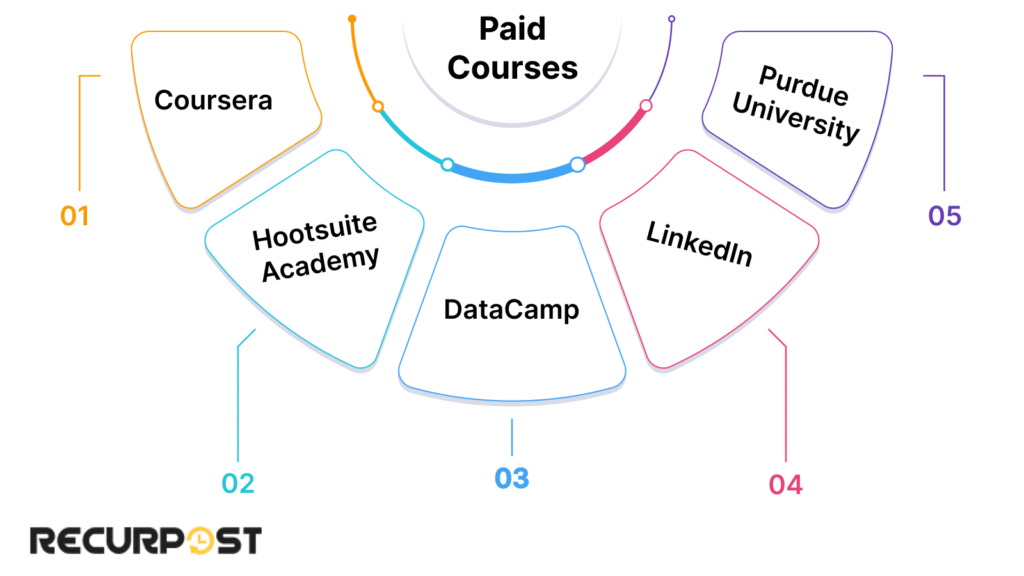
1. Coursera – Introduction to Social Media Analytics (Emory University)
[Avail Course – Coursera]
- Duration: About 9 hours
- Level: Beginner
- Format: Self-paced video, peer reviews, quizzes
- Certificate: Yes – Coursera Certificate
- Price: Free to audit, $49 for certificate
- Instructor: David A. Schweidel, Professor of Marketing
- Platforms Covered: Facebook, Twitter, Instagram
Modules Include:
- Social Listening Basics
- Interpreting Engagement Metrics
- Data Dashboards
- Writing Analytics Reports
Outcomes:
- Build dashboards in Google Data Studio
- Translate metrics into business actions
- Track campaign performance like a pro
Tip: Audit mode is free; only pay if you need the certificate.
2. Coursera – Social Media Data Analytics (University of Washington)
[Avail Course – Coursera]
- Duration: 1 week (~10 hours)
- Level: Intermediate (coding required)
- Format: Self-paced video, coding assignments
- Certificate: Yes – Coursera Certificate
- Price: Free to audit, $49 for certificate
- Instructor: Chirag Shah (20+ years in data science)
- Platforms Covered: Twitter, Reddit
Modules Include:
- Twitter API Data Collection
- Natural Language Processing
- Network & Geospatial Analysis
Outcomes:
- Pull live data from social platforms
- Clean and tag data using Python
- Visualize engagement maps
Tip: If you’re new to coding, start with DataCamp’s Python basics first.
3. Coursera – Social Media Analytics Specialization (Johns Hopkins University)
[Avail Course – Coursera]
- Duration: About 3 months (5 hours/week)
- Level: Intermediate to Advanced
- Format: Self-paced video, hands-on projects
- Certificate: Yes – Coursera Specialisation
- Price: $49–$79/month (depends on your region)
- Instructor: JHU’s Data Science Team
- Platforms Covered: Facebook, Twitter, Instagram, YouTube
Modules Include:
- Machine Learning for Social Posts
- Text Mining & Sentiment
- Network Mapping
- Real Campaign Analysis
Outcomes:
- Automate sentiment scoring
- Build influencer networks
- Compare campaign results across platforms
Tip: They also offer free GitHub code to try, even if you haven’t enrolled yet.
4. Hootsuite Academy – Social Media Marketing Certification
[Avail Course – Hootsuite Academy]
- Duration: 6–7 hours + 60-question final exam
- Level: Beginner to Intermediate
- Format: Self-paced videos, quizzes
- Certificate: Yes – Hootsuite Certified Professional
- Price: $199 (free for students via Hootsuite Student Program)
- Instructor: Hootsuite’s Expert Trainers
- Platforms Covered: Facebook, Instagram, Twitter, LinkedIn, Pinterest
Modules Include:
- Planning & Scheduling
- Social Engagement & Listening
- ROI Reports & Ad Metrics
Outcomes:
- Use the Hootsuite dashboard
- Understand native platform analytics
- Present social media ROI
Tip: Students can access this for free through their university.
5. DataCamp – Analyzing Social Media Data in Python
[Avail Course – DataCamp]
- Duration: 4 hours (24 code exercises)
- Level: Intermediate (Python needed)
- Format: Interactive coding lessons
- Certificate: Yes – Statement of Accomplishment
- Price: $49/month subscription
- Instructor: DataCamp’s Analytics Team
- Platforms Covered: Twitter, Reddit
Modules Include:
- Twitter API Queries
- Sentiment Scoring in Python
- Community Detection with NetworkX
Outcomes:
- Build and clean datasets
- Score and label social comments
- Chart conversation patterns
Tip: Use their Slack group if you get stuck.
6. LinkedIn Learning – Social Media Marketing: ROI
[Avail Course: LinkedIn Learning]
- Duration: 1 hour 10 minutes
- Level: Intermediate
- Format: Self-paced video, example files
- Certificate: Yes – LinkedIn Certificate
- Price: $29/month subscription
- Instructor: AJ Wilcox, LinkedIn Ads Expert
- Platforms Covered: Facebook, LinkedIn, Instagram, Reddit, Twitter
Modules Include:
- Campaign ROI Math
- UTM Tag Setup
- Attribution Tricks
Outcomes:
- Track ad performance by link
- Understand dark social traffic
- Calculate the cost per lead
Tip: Try their free month and take multiple courses back-to-back.
7. Purdue University Online – Digital Media Analytics
[Avail Course – Purdue University]
- Duration: 4–6 weeks (~15 hours)
- Level: Intermediate to Advanced
- Format: Instructor-led with deadlines
- Certificate: Yes – Purdue Professional Certificate
- Price: $300 per course, $2000 full program
- Instructor: Purdue Faculty (PhD-level)
- Platforms Covered: Facebook, YouTube, Twitter
Modules Include:
- Media ROI Math
- Social Listening Tools
- Tableau Dashboards
Outcomes:
- Build C-suite-ready dashboards
- Compare paid vs. organic results
- Use tools like Sprout and Brandwatch
Tip: Join Purdue’s LinkedIn alumni group to swap notes with others.
Course Comparison & Semantic Analysis
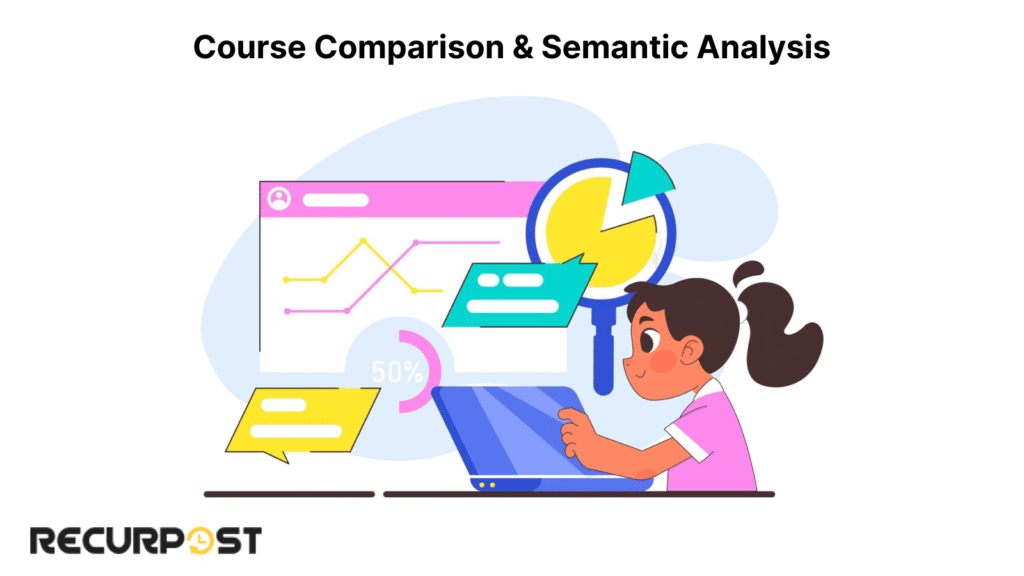
Quick Recap Table
| Course | Provider | Duration | Level | Format | Certificate | Price |
| HubSpot Social Media Certification | HubSpot Academy | ~5 hours | Beginner | Self-Paced | Yes | Free |
| Social Media Analytics Course | Quintly | 3–4 hours | Beginner | Self-Paced | Yes | Free |
| Competitive Audit Course | RivalIQ | 2–3 hours | Intermediate | Self-Paced | No | Free |
| Intro to Social Analytics | Udemy (Circus Social) | ~2 hours | Beginner | Self-Paced | Yes | Free |
| Intro to Social Analytics | Coursera (Emory) | ~9 hours | Beginner | Self-Paced | Yes | $49 |
| Social Media Data Analytics | Coursera (UWash) | ~10 hours | Intermediate | Self-Paced | Yes | $49 |
| Social Media Analytics Specialization | Coursera (JHU) | ~3 months | Intermediate–Advanced | Self-Paced | Yes | $49–$79/month |
| Social Media Marketing Certification | Hootsuite | 6–7 hours | Beginner–Intermediate | Self-Paced | Yes | $199 |
| Analyze Social Data in Python | DataCamp | ~4 hours | Intermediate | Interactive Coding | Yes | $49/month |
| Social Media ROI | LinkedIn Learning | ~1 hour | Intermediate | Self-Paced | Yes | $29/month |
| Digital Media Analytics | Purdue University | ~15 hours | Intermediate–Advanced | Instructor-led | Yes | $300/course |
What Do These Courses Fall Under?
Hypernyms:
All of these are part of larger educational programs and digital marketing training. Social media analytics courses are an essential part of any comprehensive digital marketing analytics program, focusing on analyzing social media metrics and gaining insights to drive more effective campaigns.
Hyponyms:
Some of these social media analytics courses focus on platform-specific analytics. These specialized social media analytics courses dive into tools and techniques specific to popular platforms:
1. YouTube Analytics Training
2. Facebook Analytics Certification
3. Instagram Insights Programs
4. LinkedIn Analytics for B2B
Meronyms (Parts of Each Course):
Each of these social media analytics courses usually includes:
1. Modules on topics such as social listening, data wrangling, and ROI tracking
2. Assignments or real-world projects that help you apply what you’ve learned in social media analytics courses
3. Video lectures that guide you through each lesson in social media analytics
4. Exams or certificates to validate your expertise gained from the social media analytics courses
How Courses Relate to Each Other
Taking these social media analytics courses helps you build complementary skills for a comprehensive understanding of social media analytics across various platforms:
- Taking UWash’s Social Media Data Analytics course helps you build skills in text mining and social media data analysis.
- The LinkedIn Learning ROI course teaches you attribution math using real campaign data and how to translate social media metrics into actionable business insights.
- Purdue’s course walks you through building dashboards in Tableau, using actual client data to track social media analytics and measure campaign performance.
Data Points That Help You Choose
Here are some important data points to consider when selecting the right social media analytics course for your needs:
- 4–8 weeks = average course duration for social media analytics courses
- 5–12 modules per course
- 5–50 hours of total learning content in each social media analytics course
- 3–15 real projects or case studies included
- Price range: $0–$300 (or $2000 for full certification)
Tips Based on Your Budget or Need
Zero budget? Start with HubSpot, Quintly, or RivalIQ for free social media analytics courses that offer foundational knowledge.
Need certification? Choose Coursera (offered by Emory University or Johns Hopkins University) or Hootsuite for social media analytics courses that come with a certificate.
Want to code? Go for UWash or DataCamp for social media analytics courses focused on Python and programming.
Need structure and feedback? Consider Purdue or Coursera instructor-led formats to get personalized feedback in your social media analytics courses.
Platform-specific help? For detailed platform analytics, choose LinkedIn Learning or Udemy micro-courses that specialize in social media analytics for platforms like Facebook, Instagram, or Twitter.
Platform-Specific Specializations
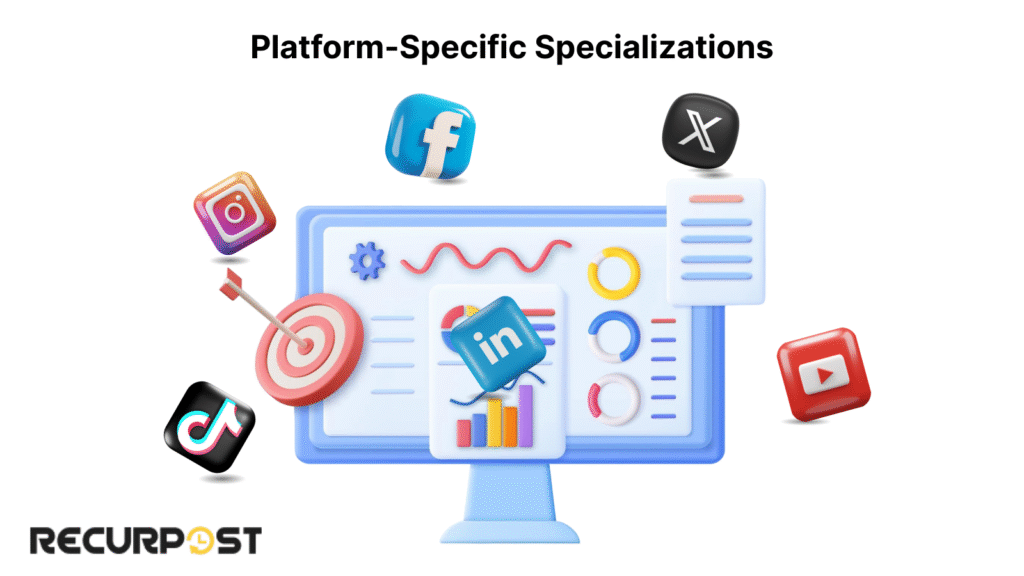
If you’re not working across every platform, skip the noise and pick social media analytics courses based on where you need results. Here’s how they break down by channel:
Facebook Analytics & Insights
Courses:
- Hootsuite Academy
- Coursera (Emory)
- Udemy (Circus Social)
Learn To:
- Read Facebook Page Insights
- Track ad results (clicks, shares, cost per result)
- Split-test campaigns (A/B testing)
Use When:
You run local ads or manage business pages with customer inquiries, and need to track social media metrics efficiently.
Instagram Insights & Metrics
Courses:
- HubSpot
- LinkedIn Learning
- Udemy Paid Courses
Learn To:
- Compare Reach vs. Impressions
- Analyze Story engagement (replies, exits)
- Track hashtag success
- Work with influencer metrics
Use When:
You want to build brand awareness or track engagement for creators or products using social media analytics.
Twitter Analytics & Network Analysis
Courses:
- Coursera (UWash)
- Johns Hopkins Specialization
- RivalIQ
Learn To:
- Spot what tweets go viral
- Visualize engagement between users
- Score tweets by sentiment
- Monitor trending topics in real time
Use When:
You manage live events, press updates, or fast-moving public conversations, requiring real-time social media analytics.
LinkedIn Analytics & B2B Metrics
Courses:
- LinkedIn Learning
- Coursera (Emory)
Learn To:
- Understand Company Page stats
- Break down who’s following you (titles, industries)
- Track lead form submissions
- Measure sponsored post results
Use When:
You sell to other businesses or want to boost your professional presence through social media analytics courses.
TikTok Analytics Fundamentals
Courses:
- Skillshare
- Udemy TikTok-Specific Instructors
Learn To:
- Analyze video views and completion rates
- Monitor hashtag challenge results
- Use Creator Tools
- Track viral loops
Use When:
You want to grow fast on short-form video or promote challenges and trends, utilizing social media analytics for TikTok.
YouTube Analytics & Video Performance
Courses:
- Coursera (JHU)
- Udemy
- HubSpot (brief overview)
Learn To:
- Compare watch time vs. views
- Track traffic sources (search, suggested, external)
- Analyze audience retention
- Spot monetization gaps
Use When:
You post video content regularly and care about getting viewers to stick around longer by utilizing YouTube analytics from the best social media analytics courses.
Modules & Learning Objectives
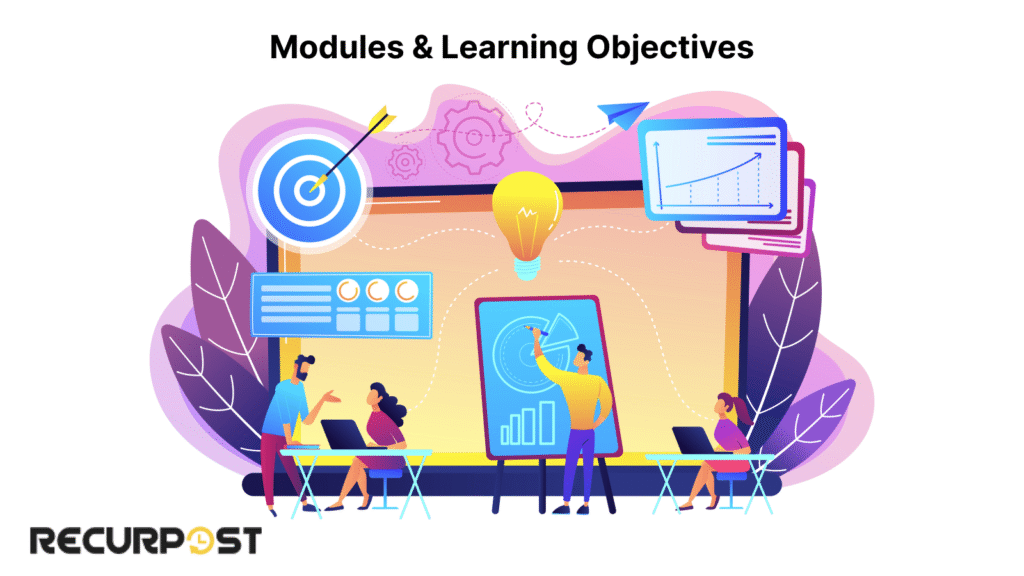
Every strong course is built like a good campaign, step by step, with clear goals. Here’s what to expect from solid social media analytics courses:
Foundational Modules
Social Listening & Monitoring
Tools used: TweetDeck, Facebook Insights, Social Mention
Goal: Hear what people are saying about your brand, competitors, or industry.
What you’ll do:
- Track brand mentions using social media analytics tools
- Spot sentiment trends across platforms
- Set up listening dashboards to track brand performance
Core Metrics & KPIs
Metrics covered: Engagement rate, CTR, reach, impressions, conversion rate
Goal: Pick the right numbers to track success.
What you’ll do:
- Match social media metrics to business goals
- Spot content winners and losers by analyzing social media data
- Set campaign benchmarks using insights from social media analytics courses
Intermediate Modules
Data Collection & APIs
Tools used: Twitter API, Facebook Graph API, Hootsuite, Quintly
Goal: Pull raw data to build your own reports.
What you’ll do:
- Extract tweets using keywords for social media analytics
- Set up dashboard integrations with popular social media analytics tools
- Export data for custom use and reporting
Data Wrangling & Visualization
Tools used: Google Sheets, Excel, Tableau, Python (Pandas)
Goal: Clean and chart data so it tells a story.
What you’ll do:
- Remove spam or irrelevant data from social media datasets
- Create clear charts to visualize social media metrics
- Spot trends and spikes using data visualization tools
Advanced Modules
Text Mining & Sentiment Analysis
Techniques used: Tokenization, stop-word removal, scoring sentiment
Goal: Turn comments and mentions into mood maps.
What you’ll do:
- Analyze user emotions from social media analytics data
- Find themes in large text datasets
- Filter by positive/negative reactions using sentiment analysis
Network Analysis & Community Mapping
Tools used: Gephi, NetworkX, NodeXL
Goal: See how users connect and who influences whom.
What you’ll do:
- Chart retweet chains and analyze connections in social media networks
- Spot micro-influencers by using social network analysis
- Visualize brand communities through network analysis
ROI & Attribution Modeling
Concepts: First-touch vs. last-touch, UTM links, conversion math
Goal: Tie actions to results.
What you’ll do:
- Track ad spend vs. leads generated through social media analytics courses
- Follow users from click to sale using attribution modeling
- Share reports with stakeholders based on ROI from social media analytics tools
Capstone & Practical Assignments

Case Study Reports
Example: Review a retail brand’s campaign across Instagram and Facebook.
What you’ll do:
- Compare social media analytics across platforms
- Spot where money was wasted by analyzing social media metrics
- Write a short improvement plan based on insights from social media analytics courses
Hands-On Projects
Example: Build a dashboard in Tableau for weekly social stats.
What you’ll do:
- Use real or mock data from social media analytics tools
- Make reports visual and clear, using data visualization techniques learned in social media analytics courses
- Present insights to a client or team based on social media metrics and analytics reports
Career & Business Outcomes

You’re not just collecting badges. These social media analytics courses help you do more with data. Whether you’re pitching clients, managing brand pages, or running your shop, social media analytics turns your guesswork into smart calls.
Skills You Walk Away With
Data Collection
You’ll know how to pull data from dashboards or APIs and set up automated reports, using tools learned in social media analytics courses.
Data Cleaning
Turn messy data into clear, usable info. That means no more hours cleaning spreadsheets manually, a crucial skill developed in social media analytics courses.
Data Visualization
You’ll build dashboards in Google Data Studio, Tableau, or Excel that tell your results at a glance. These skills are core to any social media analytics course and vital for presenting actionable insights.
Insight Generation
No more asking “Why did this post do well?” You’ll know and be able to say it with numbers from the social media analytics techniques covered in these courses.
ROI Calculation
You’ll break down how much each campaign brings in per dollar spent, a key aspect of social media analytics courses that focus on ROI and attribution modeling.
Competitor Benchmarking
Spot how your content stacks up against others in your space, a skill honed through social media analytics courses that emphasize competitor analysis.
Sentiment Analysis
You’ll track how people feel about your brand or topic, beyond just likes and shares, using sentiment analysis techniques taught in social media analytics courses.
Real-World Uses by Role
Digital Marketing Agencies
Use social media analytics to prove your work brings results. Get better at pitching and retain more clients by leveraging insights from social media analytics courses to showcase the value of your campaigns.
Small and Medium Businesses
Use numbers from social media analytics courses to decide which platform is worth your time. Save money by only promoting posts that convert, based on insights gathered from social media metrics.
Freelancers
Offer analytics as an extra service. You’ll stand out and charge more by providing data-backed insights from social media analytics and social media data analysis that show clients exactly how their content is performing.
Coaches and Educators
Build your own training modules using the data practices you learn in social media analytics courses. Help your audience get smarter too, by teaching them to apply social media analytics in their own work.
Real Estate Agents
Check which property posts bring real leads using social media analytics. Cut out the fluff and focus on high-engagement listings by tracking social media metrics that matter to your audience.
Quantifiable Gains
- 5–20 hours/week saved using automated dashboards learned in social media analytics courses.
- 20–30% better engagement by using insights from A/B tests and data analysis techniques taught in social media analytics courses.
- 10–32% increase in ROI when using social media analytics to guide campaigns, ensuring data-driven decisions.
- 15–25% boost in perceived skill with top-tier certificates from social media analytics courses, improving your professional profile.
Bonus Tips
- Block 1–2 hours each week to complete a social media analytics course. You’ll finish in under 2 months, gaining valuable skills in social media data analysis.
- Join Slack groups or forums linked to the social media analytics courses. Ask questions and share results to deepen your understanding of social media analytics.
- Practice on your own accounts or volunteer to run reports for a friend’s business, applying insights from social media analytics to real-world scenarios.
- Post your project summaries on LinkedIn to show what you’ve learned from the social media analytics courses and demonstrate your newfound expertise in social media metrics.
Learning Optimization Strategies
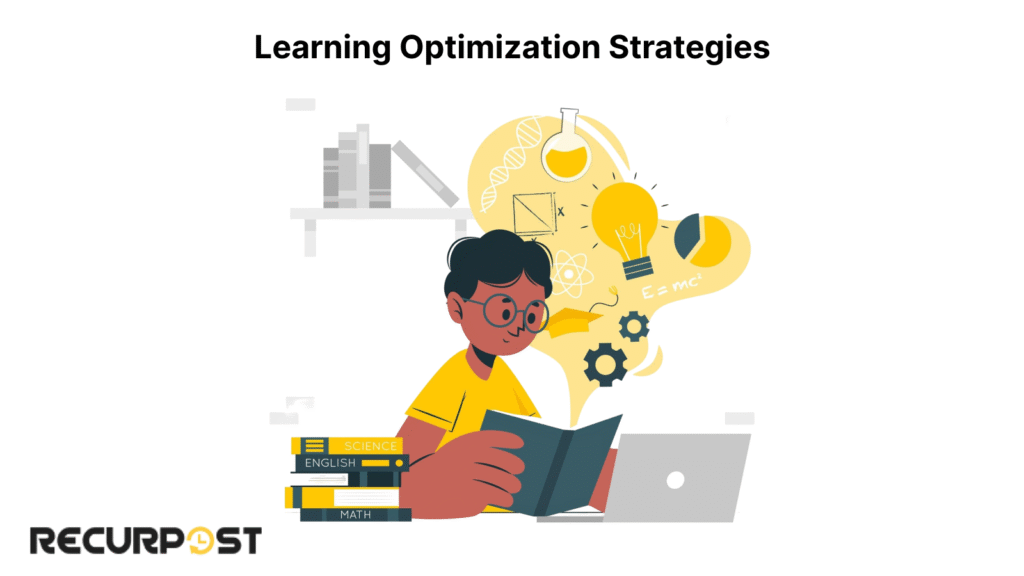
Course completion represents the initial phase of skill acquisition. Post-course application determines value. These methods maximize the benefits of social media analytics courses.
1. Set One Clear Goal
Decide what you want from the social media analytics course before you begin.
Examples:
- “I want to learn how to measure Instagram Story engagement.”
- “I want to use Google Data Studio to report results.”
- “I want to pull live Twitter data with Python.”
That way, you won’t waste time on things you don’t need to learn from social media analytics courses.
2. Do a Mini Project
Don’t wait for a client. Use your own brand or side hustle to apply what you learn from social media analytics courses.
Build a sample dashboard or write a small analytics report. This shows you’re not just watching, you’re doing, applying social media metrics and techniques learned in the course.
3. Use Free Tools for Practice
A lot of social media analytics courses reference tools that are free or have starter versions.
Try these:
- Google Data Studio – for dashboards
- TweetDeck – for real-time monitoring
- Hootsuite (free plan) – to schedule and analyze posts
- Quintly (free version) – to track basic metrics from your social media analytics course
4. Join Study Groups or Forums
Most platforms have built-in discussion boards or Slack channels.
Ask for help, share wins, and network with others doing the same social media analytics courses.
5. Ask for Feedback
Send your final project to a friend, mentor, or even a LinkedIn group.
They’ll spot things you missed. This is how your reports get sharper after completing social media analytics courses.
6. Track What You’ve Done
Use a simple Google Sheet:
- Course Name
- Hours Spent
- Modules Completed
- Main Takeaways
- Tool Practiced
This helps you stay accountable and also makes it easier to talk about your skills in job interviews or client pitches after completing social media analytics courses.
.
Conclusion
Reading social media numbers effectively doesn’t require a master’s degree. The right social media analytics course and practice are what you need.
Numerous free and paid options accommodate various goals, budgets, and schedules. Digital marketers, freelancers, SME owners, coaches, and real estate agents benefit from data-driven decision-making rather than intuition-based approaches, skills honed through social media analytics courses.
Begin with short, free options like HubSpot or Quintly for basics. These social media analytics courses will introduce you to key metrics and tools.
Progress to hands-on courses like DataCamp or Purdue’s certification, where you’ll use real tools and data in social media analytics. These advanced social media analytics courses will give you the practical skills to improve your social media strategy.
Select a social media analytics course now. Even minimal training identifies content that generates leads, sales, or engagement.
Regular social media posting without analytics knowledge creates immeasurable outcomes. By taking the right social media analytics courses, you’ll be able to measure and optimize your efforts.
Frequently Asked Questions
1. What’s the difference between a marketing analytics course and a social media analytics course?
Marketing analytics covers broader topics like email, paid ads, and SEO. Social media analytics courses focus only on platforms like Facebook, Instagram, LinkedIn, and other social networks. These specialized social media analytics courses dive into platform-specific metrics and tools.
2. Can I take these courses on my phone?
Yes. Most platforms like Coursera, Udemy, and LinkedIn Learning have mobile apps. However, coding lessons or dashboard tasks are easier to complete on a laptop, especially for social media analytics courses that require complex data manipulation or visualization.
3. Are these courses recognized by hiring managers?
Courses from Coursera (Emory, JHU), Hootsuite, and Purdue are widely recognized. While they won’t replace a degree, they prove you’ve got the skills gained from social media analytics courses that work in real situations, which hiring managers value.
4. Do I need to know math or coding before I start?
Only some advanced social media analytics courses use coding. Most beginner-level courses focus on visual tools and dashboards with little to no math beyond basic percentages. These courses are designed for anyone interested in learning social media analytics without prior technical knowledge.
5. How do I apply these skills if I don’t run paid ads?
Analytics still helps. You can use engagement rates, reach, and story views from social media analytics courses to improve posts, even if they’re organic. These metrics are crucial for optimizing content and understanding audience behavior.
6. Which course helps if I want to work for an agency?
Look for certifications like Hootsuite or Coursera Specializations. Agencies value both your hands-on knowledge and proof that you’ve learned from industry sources. Social media analytics courses will provide practical experience and credential validation.
7. What if I manage multiple accounts or clients?
Courses that include platform dashboards (like Hootsuite or Quintly) are better, as they show how to compare and manage multiple accounts in one place. Learning how to handle multiple client accounts effectively is one of the key skills taught in social media analytics courses.
8. How often should I update my skills in analytics?
Once a year is smart. Platforms like Instagram or LinkedIn change features, and algorithms shift. Look for 2025-updated courses or those offering lifetime access to stay current with changes in social media analytics.
9. Will I learn how to set up UTM tracking?
Yes, but usually in intermediate social media analytics courses. Check LinkedIn Learning or Purdue if UTM and attribution are your focus. These social media analytics courses provide essential tools for tracking campaigns and measuring their success.
10. Are courses useful if I just want to create content?
Yes. Knowing which posts perform well helps you create smarter content. Social media analytics courses teach you how to determine what formats, times, or topics work best for each platform. This data empowers you to craft content that resonates with your audience.

As a passionate content writer, I love blending creativity with research to craft compelling narratives that inform, engage, and inspire. With a strong focus on user engagement and brand communication, I create content that resonates with the audience and drives meaningful interactions.

